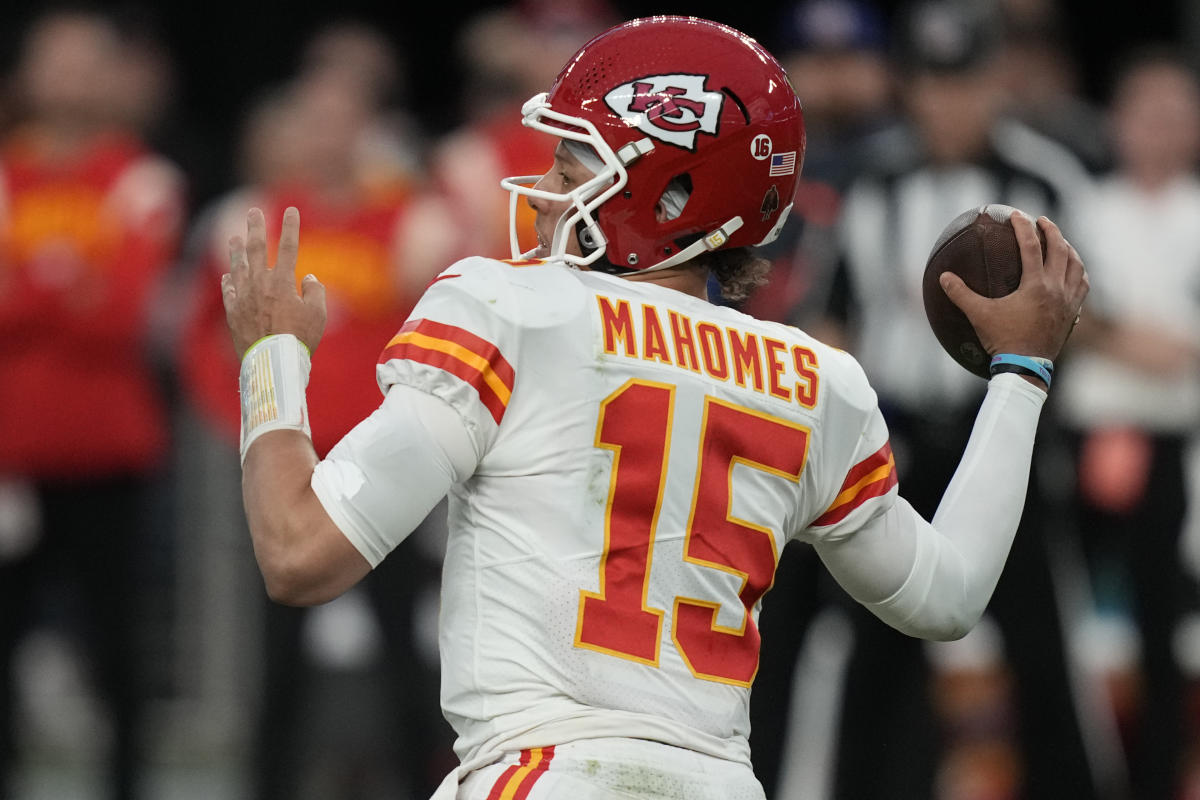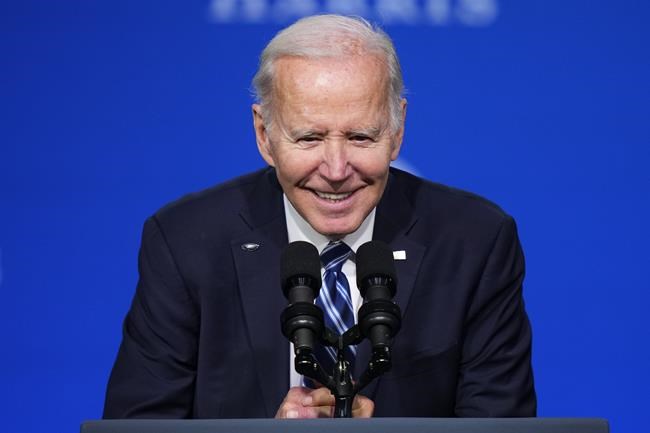Mahomes and Hurts Lead Charge of Injury-Ridden QBs in Super Bowl Battle
It is of course important that Patrick Mahomes is spectacularly talented. Equally important, he’s almost always available to the Kansas City Chiefs.
The same goes for the Philadelphia Eagles and Jalen Hurts.
Those are big reasons the Chiefs and Eagles will meet in Glendale, Ariz., in Sunday’s Super Bowl — with AP NFL MVP and Offensive Player of the Year finalists Mahomes and Hurts taking the snaps. Sure, the San Francisco 49ers almost made it to the championship game, with a last-pick rookie bumped all the way from #3 on the depth chart to starter due to injuries to others. But then Brock Purdy injured his elbow in the NFC title game in Philadelphia, leaving the Niners to rely on journeyman Josh Johnson until he suffered a concussion … which meant Purdy had to go back in … despite not being able to throw.
“That,” said 49ers coach Kyle Shanahan, “was kind of hard to take.”
This season has seen the most glaring instability in quarterbacks in the NFL, whether it’s from injury — the reason for nearly half of all regular-season changes, according to an AP analysis — or poor performance. A total of 68 QBs started at least one game, an average of more than two per team, and a record for a year without a strike.
What’s more, 13 clubs, another high, had to field at least three starters in the most important position in that or any sport. Some even went as far as four — with the Arizona Cardinals fielding that many starting quarterbacks in just four weeks.
Shuffling quarterbacks can go a long way in altering a team’s trajectory, as the Jets, Titans and Panthers found out on their way to missing the playoffs. The Dolphins made it into the postseason despite losing Tua Tagovailoa to a series of concussions, and then had substitute Teddy Bridgewater dislocate their pinky, allowing them third-string rookie Skylar Thompson and his 18-a-side 45-two-interception performance in their wildcard remained elimination.
“As a defenseman, if you see a guy at quarterback who hasn’t played much, you’re going to lick your chops and assume he’s not going to be in rhythm, and you assume he’s not going to be ready to go.” Hall of Fame defenseman Ronnie Lott said: “Our coach, Bill Walsh, basically said, ‘Hey, Ronnie, a team is only as good as the backup quarterback, because if the backup quarterback can’t come in and do things who he needs to be able to get a team into trouble.’”
And keeping the starter upright is almost always required for success.
The five best regular-season teams in the AFC, including the Chiefs, had their #1 QB available for every regular-season game (and when Mahomes walked out of a playoff game with a bad ankle, Chad Henne came in and delivered and led a 98-yard TD drive in what turned out to be a seven-point win).
Overall, nine of the 14 postseason entrants never had to contact a backup QB to start.
The Eagles came close: Hurts missed two games with a bad shoulder; Philadelphia went 0-2 with Gardner Minshew in his place.
Seems obvious: Having your favorite QB1 available week after week increases the likelihood of your offensive being successful. And that increases the likelihood that your team will win.
Note that the passer rating for QBs designated as starters was about 10 points higher than for substitutes. Or look at the Jacksonville Jaguars and Trevor Lawrence: he stayed on for 17 games and finished with five straight wins – three against the QB-plagued Jets or Titans – to earn a playoff berth.
“It’s certainly key just because everyone keeps gelling. You get the chemistry together. Receivers know, ‘If I run that route at that stage, the ball will get thrown to that point just because we’ve done it a million times,’” said Jaguars offense coordinator Press Taylor. “You can understand how (an absence due to injury) throws the boys off track.”
Backup quarterbacks generally do not have practice time with the rest of the first-team offense during the season. So removing the top pick at this point could result in growing pains. Purdy was an exception, of course, and there were others.
“Sometimes when a quarterback goes down,” Cowboys guard Zack Martin said, “there’s kind of a panic in the locker room and in the team, like, ‘What do we do now?’”
Some of the season’s dominant storylines involved eliminated QBs, from Miami’s Tagovailoa to Baltimore’s Lamar Jackson to reigning Super Bowl champ Rams Matthew Stafford, or efforts to protect them, be it the outcry among defenders over roughing-the-passer Calls or the 15-yard penalty on Bengals defensive end Joseph Ossai for pushing an out-of-bounds Mahomes that helped KC position themselves for the winning field goal in the AFC title game.
Reducing quarterback injuries is “obviously a high priority for us,” said Troy Vincent, the NFL’s executive vice president of football operations. “It’s critical that we investigate… where they’re coming from. Are these legal hits? Are they in the bag? Out of the bag?”
Increased impatience when it comes to winning and losing is part of the reason for the switch – the same kind of itch that leads to first-year coaches being fired.
But injuries always seem to happen.
One possible cause: Rushing attempts by signal callers hit a record high (2,309) and were also the highest per game, up 47% from 2012. This increases the risk of injury. Another: The NFL’s 1,297 total sacks were the third-most of all time, and the 4.8-per-game average was the third-highest in the past nine years. (As an aside, Mahomes and Hurts might want to watch out for Super Sunday: The Eagles 1st, the Chiefs 2nd in sacks.)
It’s certainly possible, or at least plausible, that whatever the NFL is doing to keep quarterbacks safe isn’t working — and really can’t be working.
“At this point, you’re hoping,” Lott said, “that your quarterback can take the beating.”
The 49ers under Shanahan are Exhibit A: The team only kept a quarterback healthy once in its six seasons — in 2019, when they happened to reach the Super Bowl.
They’ve gone through at least three starters in four of the past six seasons; This time Trey Lance broke an ankle while running in week 2 and Jimmy Garoppolo broke his foot on a sack in week 13.
“It’s great,” star tight end George Kittle said sarcastically. “It’s an experience. I just have a plethora of quarterbacks to choose from.”
The injury spate among the 49ers and others is raising questions about whether the league should bring back some form of the 1991-2010 rule that allowed teams to have a third QB in uniform who would not count against the game-day roster limit and would be available in an emergency.
“We were scared to death when that rule ended, but you kind of forget it because you just don’t see someone having to go through it,” Shanahan said. “But then you’re reminded of how quickly a football game is over when that happens.”
The NFL’s Vincent said there have been “several discussions” about restoring the third-quarterback rule and that the General Manager Advisory Committee is “considering” moving it ahead of full membership.
“What you don’t want is Christian McCaffrey playing quarterback,” Lott said, referring to the 49ers’ do-everything running back. “With all due respect – he’s a damn fine athlete, but he needs to be where he’s most effective, and that’s running and catching the ball, not playing quarterback.
___
AP Pro Football writers Schuyler Dixon, Mark Long and Teresa M. Walker, and AP Sports writers Dave Skretta and John Wawrow contributed to this report.
___
AP NFL: and
Don’t miss interesting posts on Famousbio










